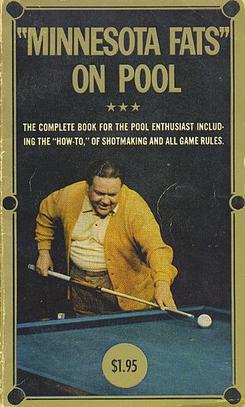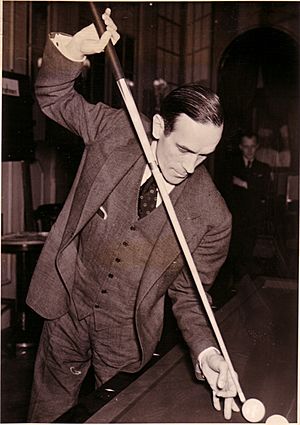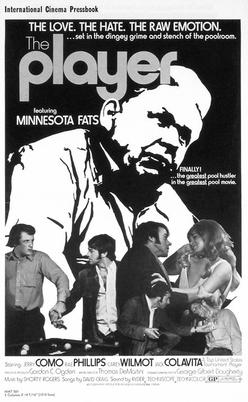Rudolf Wanderone facts for kids
Quick facts for kids
Rudolf Wanderone
|
|
|---|---|

Wanderone on the front cover of "Minnesota Fats" on Pool, 1967
|
|
| Born |
Rudolf Walter Wanderon Jr.
January 19, 1913 New York City, New York, U.S.
|
| Died | January 15, 1996 (aged 82) Nashville, Tennessee, U.S.
|
| Other names | Minnesota Fats New York Fats Broadway Fats Chicago Fats Double-Smart Triple-Smart Fats |
| Occupation | Professional pocket billiards player |
Rudolf Walter Wanderone (born Rudolf Walter Wanderon Jr.; January 19, 1913 – January 15, 1996), was a famous American professional pool player. He was best known by his nickname, Minnesota Fats. Even though he never won a major pool tournament under this name, he was one of the most recognized pool players in the United States. People knew him not just for his playing, but also for his entertaining personality. In 1984, Wanderone was added to the Billiard Congress of America Hall of Fame. This was because he spent many years helping to make pool popular.
Wanderone started playing pool when he was very young in New York City. As a teenager, he became a traveling pool hustler. A pool hustler is someone who plays pool for money, often pretending to be worse than they are to trick opponents. Later, in his thirties, he moved to Du Quoin, Illinois. There, he met and married his first wife, Evelyn. During World War II, he played pool against servicemen in Norfolk, Virginia. After the war ended, Wanderone went back to Illinois and played pool less often.
Wanderone was sometimes called "New York Fats" when he played pool. He later took the name "Minnesota Fats" from a character in the 1961 movie The Hustler. He said that the character, played by Jackie Gleason, was based on him. He used this connection to the movie to get book deals and appear on television. This included playing matches against his rival, Willie Mosconi. Later in his life, Wanderone divorced Evelyn. He then moved to Nashville, Tennessee, where he married his second wife, Theresa. He stayed with her until he passed away.
Contents
Early Life and Pool Career
Wanderone was born in New York City. His parents, Rudolf Walter Wanderon and Rose (Rosa Burgin), were immigrants from Switzerland. They had three children, and Rudolf Jr. was born in 1913. He was known as "Rudy" to his friends and family. Rudy started playing pool as a child in Washington Heights, Manhattan.
In 1923, he traveled to Europe with his father. There, he learned from Erich Hagenlocher, a German billiards champion. His first big match was in 1926. He played against "Cowboy" Weston, a former nine-ball champion, and won easily. Wanderone left school after eighth grade. He then became a traveling pool hustler. He spent much of the 1920s playing at Cranfield's, a pool hall in New York City. He got his first nickname there after beating another hustler named "Smart Henry." Their intense games led his friend Titanic Thompson to call Wanderone "Double-Smart."
By the mid-1930s, during the Great Depression, Wanderone managed a pool hall in Anacostia, Washington, D.C. He became more famous and got more nicknames. These included "Triple-Smart Fats," "New York Fats," "Broadway Fats," and "Chicago Fats." Other hustlers, like the then-unknown Luther Lassiter, came to play against him.
In 1941, Wanderone and his friend Jimmy Castras arrived in southern Illinois. This area was a big center for pool hustling. He settled in Du Quoin, Illinois, and kept playing for money. He met Evelyn Inez Graff there, and they married on May 7, 1941. After their wedding, the Wanderones lived in Dowell, Illinois. In 1942, they moved to Norfolk, Virginia. Norfolk was a busy place for American soldiers and shipbuilding. This meant more people and more interest in games. Wanderone and his friend Lassiter quickly saw the chance to earn money. After World War II, however, there were fewer opportunities. The Wanderones then returned to Illinois. Through the 1950s, Wanderone played less often. He only made occasional trips to New York City to hustle.
Becoming "Minnesota Fats"
In 1961, the movie The Hustler came out. It was based on Walter Tevis's novel The Hustler. The film is about a pool player named "Fast Eddie" Felson. He wants to beat the best pool player in America, "Minnesota Fats." World Champion Willie Mosconi helped with the movie. He also did the trick shots. Wanderone quickly changed his nickname from "New York Fats" to "Minnesota Fats." He started telling everyone that the movie character was based on him. Walter Tevis, the author, always said this was not true. However, a researcher named Derek Kirunchyk looked at Tevis's original notes. He found that Tevis had changed the character's name from "New York" to "Minnesota." This makes Fats' claim seem more believable.
Wanderone's fame as "Minnesota Fats" led to a job at Rozel Industries, a company that makes billiard tables. He became an executive and played exhibition matches and gave demonstrations. In 1965, Rozel published Fats' first book, Minnesota "Fats" Book of Billiards. On January 17, 1965, he appeared on the TV game show What's My Line?. He successfully tricked the panel, who had to guess his job.
In 1966, he wrote his life story, The Bank Shot, and Other Great Robberies. He wrote it with Tom Fox, a journalist from Sports Illustrated. His first TV game show, Minnesota Fats Hustles the Pros, started in 1967. It showed "Fats" playing against other professional players.
In 1967, he finished and published an instruction book called Minnesota Fats on Pool. This book was printed many times until 1976. It was reissued as a hardcover in 1993 and is still easy to find today.
The next year, on January 24, 1968, Fats was a guest on The Joey Bishop Show. By 1970, another short TV show, Celebrity Billiards with Minnesota Fats, featured Fats playing against famous guests like Sid Caesar.
Fats played himself as "Minnesota Fats" in a movie called The Player. It was made in December 1970. He was shown clearly on the movie's poster. The movie was released in 1971. That same year, Fats was a guest on The Tonight Show Starring Johnny Carson (September 21, 1971). He even won US$1 from Carson in a friendly game. He also appeared on the British David Frost Show (October 13, 1971). His fame as "Fats" made it hard for him to hustle effectively anymore. So, he relied more on exhibition games to earn money.
By 1979, Fats was famous enough to play himself on a TV detective show called Vega$. The episode showed "Fats" playing pool against professional player Jimmy Mataya. In 1980, while visiting St. Louis, Fats had to order more autographed pictures. This was because he was stopped 37 times by fans. During this trip, he lost to Michael Boulton 4 out of 10 times in pool games.
Rivalry with Willie Mosconi
Fats enjoyed creating a friendly rivalry with world champion Willie Mosconi. They had different ideas about how pool should be seen. Fats saw it as a fun, exciting game for gambling. Mosconi saw it as a polite hobby and an art form. Mosconi's wife, Flora, said her husband disliked Minnesota Fats. She felt that Fats hurt the game's image instead of helping it. Fats would often say, "I may have 'given away' a few games to good players, but I have never lost a real money game since I was old enough to spell 'Weeli Mesconi'."
The two played a televised match on February 14, 1978. It was on ABC's Wide World of Sports. Nearly 11 million people watched the game. It was the second most-watched episode of the show that year. The game was held at New York's Waldorf Astoria Hotel. Howard Cosell was the announcer. Fats lost the game, but he won over the audience. He did this with his funny talk and joking manner. Mosconi, on the other hand, seemed cold to the viewers.
"Fats" lost several rematches to Mosconi in the years that followed. However, in October 1984, Fats finally beat his rival. This was during the nationally televised Resorts International Shoot-Out. It was Fats' last big TV appearance. The event started with a trick shot competition. Four players took part: Fats, Mosconi, Steve Mizerak, and Allen Hopkins.
Next, Hopkins and Fats played against Mosconi and Mizerak in doubles seven-ball, then nine-ball. Fats and Mosconi then played a one-on-one game of seven-ball. Fats won the match. During the game, Mosconi was very quiet and polite. He wore earplugs to block out Fats' loud and playful talk. But that didn't stop Fats from putting on a show for his fans. In an interview, Fats was asked about his plan to beat Mosconi. He said he thought to himself, "I'll make [the 7 ball] on the break and end it... then I'll help carry Willie out on a stretcher."
Later Life and Legacy
In 1984, the Billiard Congress of America added Fats to its Hall of Fame. This was for his "Meritorious Service" because he helped make pool popular. In 1984, Fats separated from his wife, Evelyn, and they divorced a year later.
Fats moved into the Hermitage Hotel in downtown Nashville, Tennessee, in 1985. He lived there for several years. In 1992, he had surgery for a knee injury. During the surgery, he had a serious heart attack but survived. In 1993, he met and married his second wife, Teresa Talley Bell. He lived in Bell's Nashville house until he passed away on January 15, 1996. This was four days before his 83rd birthday.
Fats had no known children. The singer Etta James believed that he was her biological father. She said her mother and others who knew her mother told her this. However, there is no public proof of this. James and Fats only met once, in 1987.
In her book, Rage to Survive, James wrote about their meeting. She said that Fats did not say yes or no to being her father. According to James, he told her he did not remember enough details from that time in his life to know if he could be the father.
The words on his tombstone say: "Beat every living creature on Earth. 'St. Peter, rack 'em up. — Fats'".
Personality and Style
Fats was known for being flashy, bragging, telling tall tales, talking fast, and being very entertaining. Even the famous boxer Muhammad Ali said Fats was better at bragging than he was. His biographer, R.A. Dyer, wrote that Fats made up a story about a car crash. He said it brought him to Illinois by chance. Fats encouraged this story to be spread and made bigger in his own book. This helped make his public image seem more mysterious. He often falsely claimed to have beaten Willie Mosconi. Mosconi even tried to sue him for telling lies, but it didn't help much.
According to Dyer, Fats was famous for talking non-stop. He would talk about things he knew little about, or tell stories about himself. At the start of his first TV match against Mosconi, Fats claimed: "I've never lost [a game] for money in my life; beat everyone that ever lived." Yet, as Dyer admits, "Pool hustlers are, by nature, liars. And by this measure, Minnesota Fats was just a very, very good pool hustler."
Fats loved animals. He was said to have dozens of cats and dogs at once. He spent a lot of time finding homes for stray animals. "I'm crazy about every living creature," he wrote in The Bank Shot. "It doesn't matter what it happens to be. I even love insects; in fact, I wouldn't swat a fly or a mosquito for a whole barrel of gold."
He was remembered for his clever sayings and puns. Fats once wrote, "If you happened to drive from Mobile to Dowell [Illinois] with a carload of pool hustlers, you would get bit so hard and so often that you would need a malaria vaccine and a new bankroll as well." This referred to both the many mosquitos in the area and how hustlers try to trick people. Fats is remembered for saying as he left a pool room, "Boys, the only difference between me and everybody else is that everybody else drives around in a Volkswagen, and Minnesota Fats drives around in a Duesenberg." Fats would go almost anywhere to help promote pool, and he was always a favorite with the crowd.
Fats owned several fancy cars called limousines during his career. He once traveled the country in a colorful Lincoln limousine. His long nickname was painted on the side panels in see-through paint. It changed colors as it moved with the sun's reflections: "Minnesota Fats, King of Pool." His 1980 Cadillac Fleetwood limousine was later in the Nashville auto museum until it closed.
Fats was known for his quick and funny replies. When he was called the "uncrowned king" of pool because he didn't play in tournaments (he was too busy hustling), he replied: "You judge a king by the size of his wallet and his palace. You can leave the crown in the toilet."
|
See also
- Minnesota Fats: Pool Legend (a Sega Genesis and Sega Saturn video game featuring a virtual version of Fats)
 | Misty Copeland |
 | Raven Wilkinson |
 | Debra Austin |
 | Aesha Ash |



